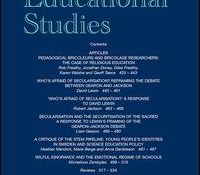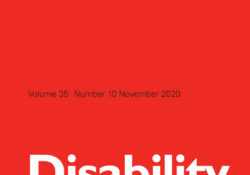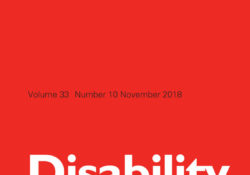tandfonline.com har udgivet en rapport under søgningen “Teacher Education Mathematics”: ABSTRACT ABSTRACT The phenomenon of digital differentiation, or stark variations in ability to access Internet hardware and/or infrastructure, has been a feature of provision since its early days. This article explores the impact of digital differentiation on two groups of young people, in England and Germany. It is based on fieldwork that took place during the academic year 2018-2019, just before the global pandemic threw the issue of equality of Internet access into sharp relief. The article begins by describing the empirical design of the My Life Online project, including background, sampling, instruments, ethical aspects and the initial data analysis approach taken to ensure reliability and validity. It then develops a further analysis drawing on Halford and Savage’s hybrid Bourdieu/Actor… Continue Reading →
Like this:
Like Loading...
tandfonline.com har udgivet en rapport under søgningen “Teacher Education Mathematics”: Abstract Abstract For people with intellectual disabilities who do not enter the labour market, school is usually the main chapter of their socialization with the wider society. Nevertheless, little is known about their long-term perceptions of this period. We conducted interviews and focus groups on the school experiences of 16 Portuguese adults with intellectual disabilities. Results show differences between older and younger participants in their accounts of social relations and educational methods, which result from changes in special educational policies in Portugal. Overall, members of both groups evaluate their school experience positively. Our results indicate that although there is a move towards more inclusive schools, discrimination is still prevalent. These results are discussed in terms of their psychosocial consequences, as… Continue Reading →
Like this:
Like Loading...
tandfonline.com har udgivet en rapport under søgningen “Teacher Education Mathematics”: Abstract Abstract This article highlights two current issues facing autistic young people in their pursuit of suitable education. First, mainstream education is advocated for all, from a rights-based perspective on inclusion, yet, as 12 autistic young people from Northern Ireland demonstrate, being academically able does not mean they are mainstream able. Second, autistic young people, who are largely missing from the debate on educational improvement, and in particular the inclusion debate, ought to be central to this discussion and have much to add. The social model of disability is considered relevant to autism. For the young people referred to in this article, inclusion is a feeling (a sense of belonging) not a place (mainstream or otherwise). Link til kilde
Like this:
Like Loading...
tandfonline.com har udgivet en rapport under søgningen “Teacher Education Mathematics”: Abstract Objective: To test the items, identified through qualitative inquiry that might form the basis of a new Malocclusion Impact Questionnaire (MIQ) to measure the oral health-related quality of life (OHQoL) of young people with malocclusion. Methods: Piloting with 13 young people reduced the number of items from 37 to 28. Cross-sectional testing involved a convenience sample aged 10–16 years, attending the Orthodontic Department of the Charles Clifford Dental Hospital, Sheffield. The fit and function of the initial MIQ questions were examined using item response theory. Results: 184 participants (113 females; 71 males) completed a questionnaire (response 85%), seven participants were excluded due to missing responses. The mean age of participants was 12·9 years (SD 1·4) and they had a… Continue Reading →
Like this:
Like Loading...



